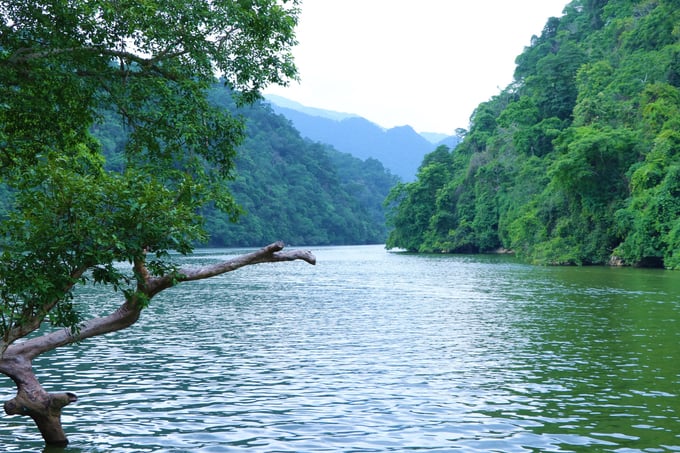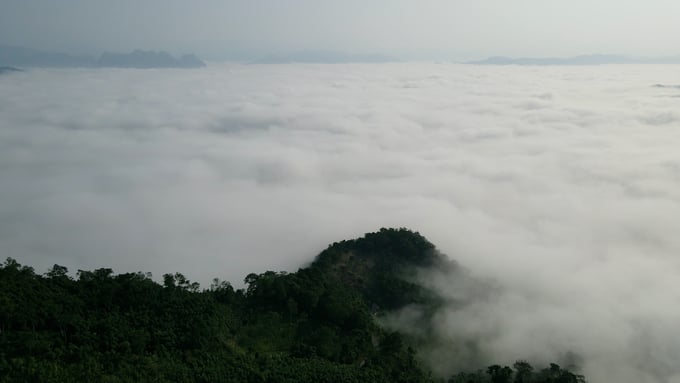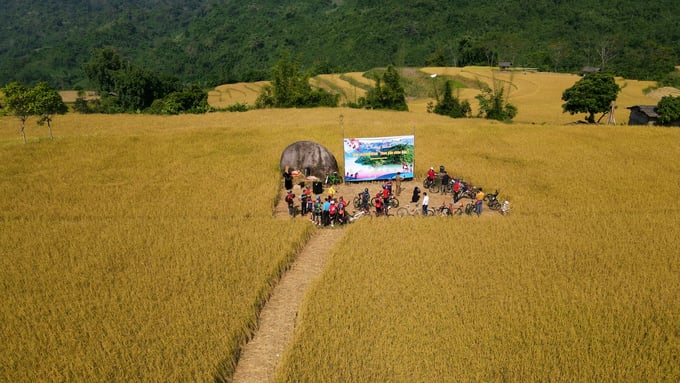November 26, 2025 | 09:17 GMT +7
November 26, 2025 | 09:17 GMT +7
Hotline: 0913.378.918
November 26, 2025 | 09:17 GMT +7
Hotline: 0913.378.918

Ba Be National Park, with Ba Be Lake as its center, has been identified by Bac Kan province as a key tourist area, aiming to become a national tourist area. Photo: Ngoc Tu.
With an anticipated investment exceeding 1 trillion VND, the Bac Kan Provincial People's Committee has officially approved the scheme for the 2021-2030 period. The objective of this significant financial commitment is to establish Ba Be National Park as a premier eco-tourism destination, while simultaneously promoting sustainable development and conservation.
Of the total investment, Bac Kan province plans to allocate nearly 79.6 billion VND from public investment funds, while the remaining capital will be sourced from private investors. The investment will be phased over time, with 284 billion VND (26.48% of the total) expected to be mobilized by 2025. Between 2026 and 2030, an additional 790.7 billion VND (73.52% of the total) will be raised to support the park’s development.
The objective of the initiative is to develop a sustainable and comprehensive forest management strategy for Ba Be National Park that guarantees the preservation, enhancement, and protection of its natural, historical, cultural, and scientific assets. Additionally, it endeavors to emphasize the park's aesthetic allure, with a particular emphasis on the breathtaking landscape of Ba Be Lake, while simultaneously facilitating responsible tourism and conservation.

Don Den Peak in Ba Be National Park is ideal for eco-tourism and resort tours. Photo: Ngoc Tu.
The anticipated outcomes of the tourism industry in Ba Be National Park include the creation of employment opportunities, the increase in local incomes, and the improvement of the overall quality of life for neighbors. Additionally, the initiative will establish a robust foundation for the attraction of future investments in leisure activities, resorts, and eco-tourism within the park's protected forest areas.
By 2025, Bac Kan province intends to attract six investment projects for forest environment licensing and finalize the development and operation of three eco-tourism sites. It is anticipated that these initiatives will attract 150,000 visitors annually, with international tourists comprising 10% of the total. Additionally, they are expected to generate stable employment for approximately 800 workers.
The project's objective is to attract eight investment projects for forest environment leasing by 2030, resulting in the accommodation of approximately 450,000 visitors annually, 20% of whom will be international travelers, and the generation of stable employment for approximately 2,000 workers.
Ba Be National Park has allotted nearly 3,594 hectares for the eco-tourism, resort, and recreational project, with 61.25 hectares reserved for construction. The project stipulates that construction pertaining to tourism will not be permitted within the strictly protected zone of Ba Be National Park, which spans over 70 hectares.
The administrative service zone will encompass 2.87 hectares, while the ecological restoration zone will have a designated construction area of over 58 hectares. In order to facilitate the development of eco-tourism, resorts, and recreational activities, approximately 79 hectares of agricultural land in the buffer zone will be designated for forest environment licensing. Community-based tourism development is the objective of the buffer zone, which spans four villages—Pac Ngoi, Bo Lu, Coc Toc, and Ban Cam—and covers 466 hectares in Nam Mau commune, Ba Be district.

The buffer zone of Ba Be National Park has many beautiful landscapes and fresh nature. Photo: Ngoc Tu.
The project also specifies the development of 17 eco-tourism sites, six waterway eco-tourism routes, four roadway eco-tourism routes, and five forest trekking trails.
Bac Kan province has designated priority eco-tourism investment projects for 2025, such as the Botanical Garden project, the Pac Slai - Khau Cum project, the Ao Tien - Na Duong project, the Puong Cave project, the Bo Ho - Keo Sliu project, and the Bo Lu project.
The investment attraction efforts for the 2026-2030 period will concentrate on forest environment leasing for supplementary eco-tourism projects, such as the Coc Toc - Ta Han project, the Dau Dang - Ta Ken project, the Nam Dai - Khau Qua project, the Pac Ngoi project, the Leo Keo - Lung Quang project, the Slam Bac - Na Nieng project, the Lung Chuong project, and the Khuoi Luong project.
Translated by Linh Linh
/2025/11/24/3536-2-112800_176.jpg)
(VAN) Dong Nai now has tens of thousands of hectares of forests certified for sustainable management, and this area will continue to be expanded in the coming period.

(VAN) Vinh Ha hamlet (Dai Xuyen commune, Hanoi) is shifting away from small-scale farming as households adopt bioscurity into their breeder chicken models.

(VAN) Heavy rains make aquatic species more vulnerable to disease. Proactive water management and high-tech systems help farmers prevent outbreaks and protect yields.

(VAN) Greenhouses are shifting production mindsets in Binh Lu commune, enabling farmers to ‘weather the sun and rain’ and secure stable vegetable harvests throughout the year.

(VAN) Green transition is crucial for the Mekong Delta amid climate change and stricter standards, offering a path toward sustainability.

(VAN) Dong Thap promotes agricultural restructuring, forms large specialized farming zones, raises the value of agricultural products and develops toward ecological and high-tech directions.
/2025/11/22/4018-4-213342_747.jpg)
(VAN) The Mekong Delta Agricultural Experts Club has attracted 143 experts and researchers to participate in providing consultancy and contributing initiatives to the development of one million hectares of high-quality rice.